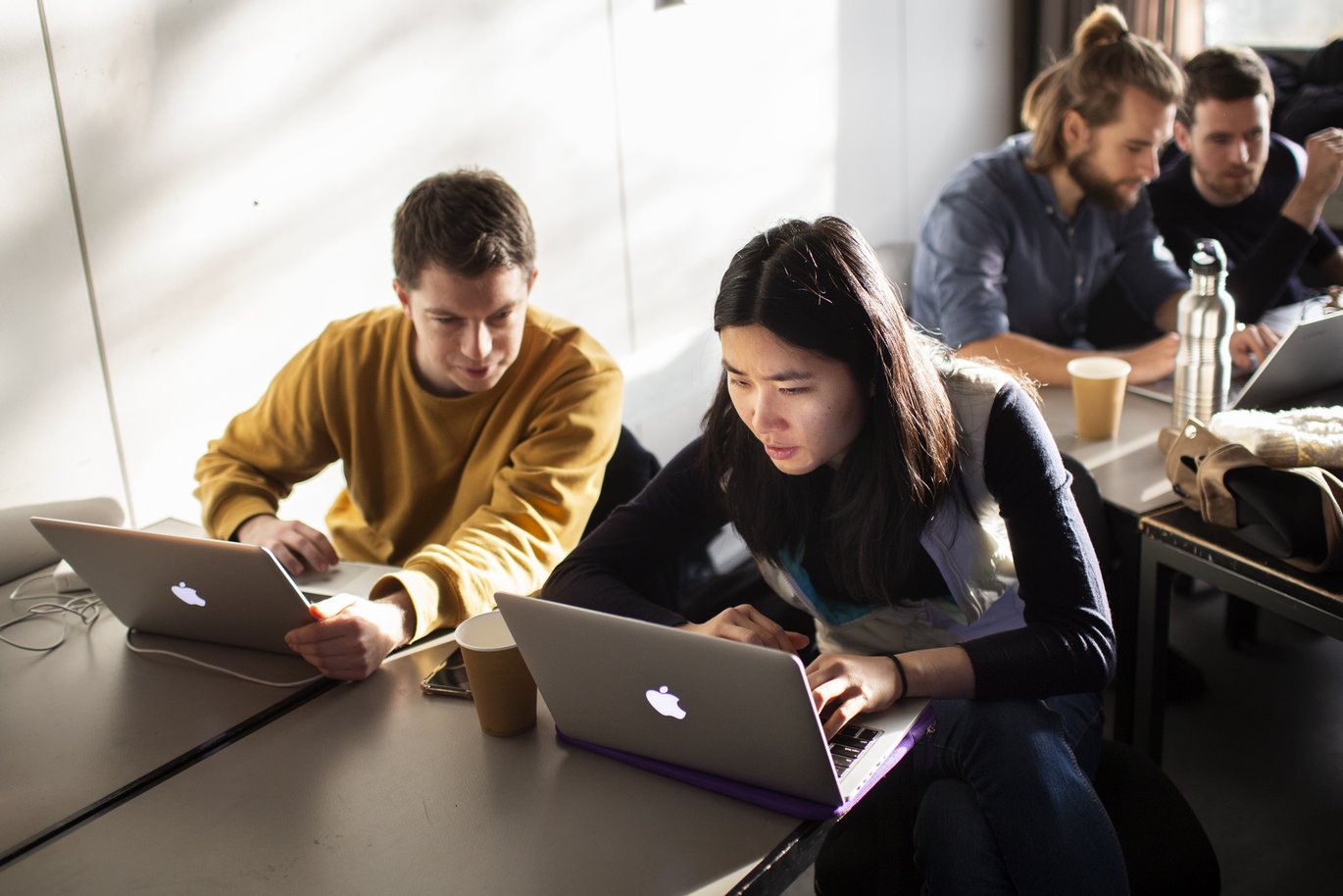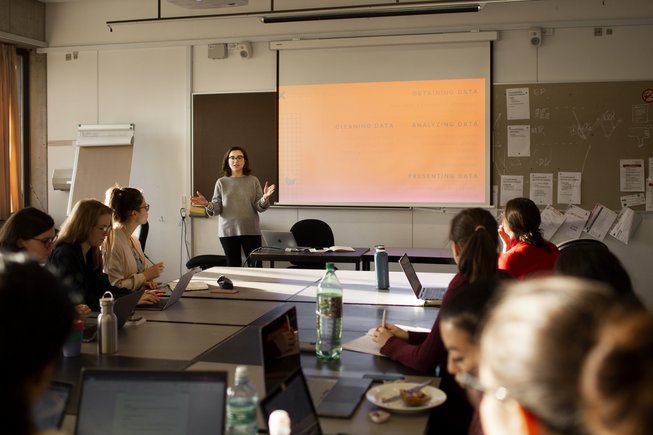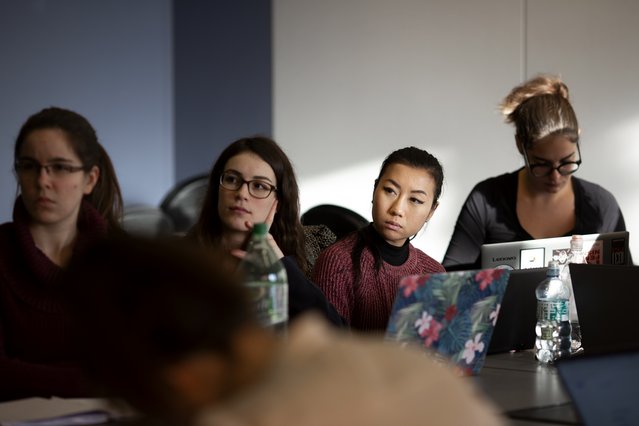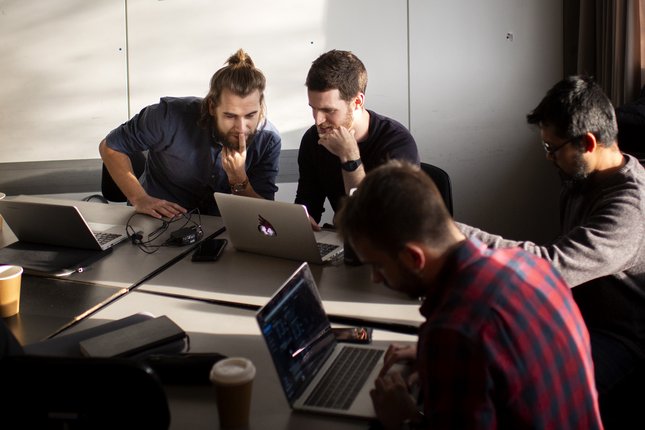Kaukab Tahir Shairani reflects on Mundus Journalism's first ever Bellingcat inspired workshop.
On the 5th December, around 50 Mundus students took part in the very first Bellingcat-inspired workshop, Kaukab Tahir Shairani reflects on the day's events.

If a scene from a Mundus lecture hall were to be recreated, I would seek inspiration from the iconic opening sequence from the ever-famous HBO series ‘The Newsroom’. It is a no brainer that a journalist like myself has obviously watched the show. But what stuck with me is the engrossing debate on “Why America is the greatest country in the world?”
We’re a cohort comprising 33 nationalities. And naturally when you’re encouraged to critically analyse scholarship on international politics during class discussions, what follows is similar to a discourse on whether America is or isn’t the greatest country in the world. We’re diverse and posit traits that are foreign to each other’s taste buds. Now we’re part of a Mundus family that goes 15 years back, which means being blended in an alumni network that is indeed diverse, unique and making waves. We just keep getting surprised!
While the programme has a theory-driven research focus, the Mundus Journalism consortium ensures that students continue to reboot their existing journalistic skillset by bridging theory and applied journalism. Thanks to Bettina and Morten—the two people who’ve put night and day into literally piecing this programme together. The duo organised a Bellingcat-inspired Investigative and Data Journalism workshop whereby current and former Mundusians were invited to train our cohort on online investigative and data journalism tools.
This workshop was the first-of-its-kind. Bettina, who floated the idea to conduct a Bellingcat-inspired workshop maintained that these tools could be an important contribution in a journalism career. “We discussed how to approach this and thought of our vast alumni, many of whom have had exposure with Bellingcat and are aware of these tools,” she said.
Of the three speakers, one belonged to the current cohort. Giovanna Fleck, who completed her undergraduate from Brazil and has three years’ worth of newsroom experience as a video editor and reporter and has completed a course on data journalism in New York. She introduced a set of vital social media tools meant for fact-checking, organising and cleansing content online. “It all started with Bettina. She wanted to provide Mundus students with the kind of skills the journalists from Bellingcat have,” said Giovanna, adding that she had been following their work for a long time.

We then had a talk Dr Penny Sheets Thibaut who is currently serving as the Head of the Mundus Board of Studies and teaching at the University of Amsterdam (UvA). The focus of her workshop was on geo-based searching and verification. “I’ve been teaching in the programme for eight years and one of those courses is data journalism. I took a workshop with a Bellingcat professional, Christiaan Triebert, who now works with the New York Times but travels around the world,” said Penny.
And finally, we met an alumnus from the very first Mundus batch in 2005. A seasoned journalist Alexander Belyakov based in Canada. Alex is originally from Ukraine and therefore, Bellingcat’s first ever investigation on the downing of the Malaysian flight MH17 piqued his interest.
Alexander conducted a session on open source tools used in investigative journalism with examples from Ukraine. “I learned about Bellingcat when they published a report about Ukraine and their representatives visited Toronto,” he said, emphasising that attending a Bellingcat workshop costs up to CAD$3000, which is why Mundusians are fortunate to benefit from this session without having to pay extra.
When asked how Bellingcat is different from other news verification platforms, Penny elaborated that none of the people working at Bellingcat are conventional journalists including the founder Elliot Higgins. Yet, they are aware of tools that various news organisations have no idea about.
“While news organisations are rightfully coming up with journalism first and then using more and more tools for fact-checking, they are also under incredible pressure in terms of both funding and time constraints, unlike Bellingcat, which has no such constraints,” she continued.

Given the success of the workshop, the Mundus Journalism team intends to repeat it again in the future. In this manner, students with a certain skillset will be able to impart knowledge to their peers about something they’re yet to learn. “Involving alumni, especially, shows an extra dimension to students about what’s out there and makes the experience that much more real,” Bettina said.
The end of the training was marked by a brief session whereby the cohort gathered to share comments from the day’s learning. Several questions were also raised. With their diverse work portfolios, students shared viewpoints on how Bellingcat-inspired tools could enhance their areas of expertise. Present in the room were individuals from over 30 countries including trainers, students and Mundus staff who collectively addressed a debate that lingers on: Is the ever-increasingly digitalised landscape of the world limiting the role of journalists and reporters? The topic was raised amid citizen journalists and social media intervention. “The role of journalists is surely changing. It’s becoming more and more about how to treat the data that’s available to us,” addressed Penny, adding that journalists still remain vital as they’re the ones who have the skills to interpret the data and cutting the clutter.

Alex, while endorsing Penny’s point of view, distinguished between the roles of bloggers and journalists.
We were left in closing with yet another riveting take-home argument: Our industry may be in the deepest throes of crisis. But our job remains daunting and extremely important if the audience continues to pay for newspaper subscriptions because we’re the one telling the stories. And if we want to continue participating in debates similar to those about whether or not the U.S. is the greatest country in the world and be able to critically respond, we need to keep solidifying concepts to be able to bridge them with practical journalism training.
In the words of veteran journalist Mark Shapiro: “The Mundus Journalism programme is unique and draws from the intersection between academic scholarship in global studies and the so-called real-world of journalistic inquiry,” and that’s exactly what we experienced during this workshop.
If you'd like to apply to join the next cohort of Mundusians starting in Aarhus next September, then you have until the 10th January, 2020 12:00 CET to get your application in!